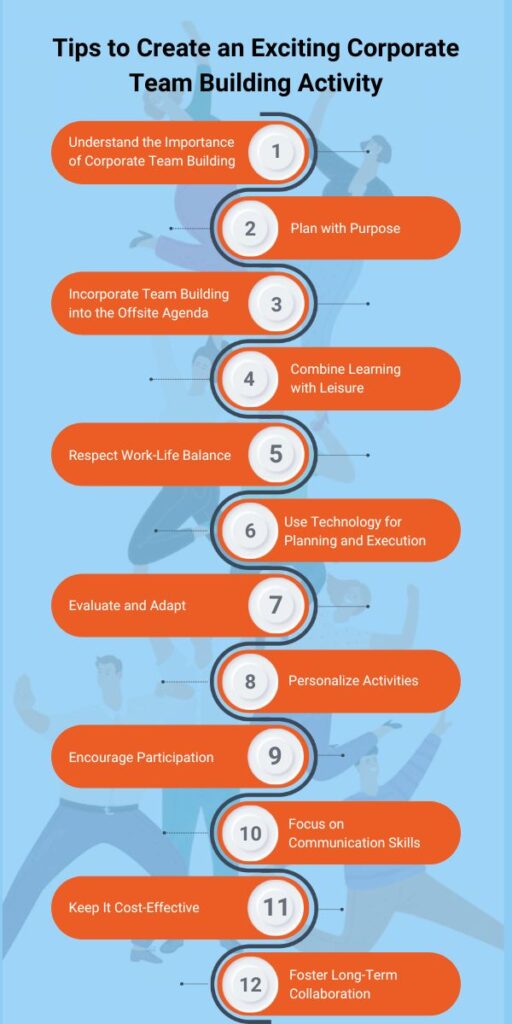
Striking the perfect balance between productivity and team building is essential in today’s fast-paced corporate environment. While productivity drives business success, effective team building fosters collaboration, creativity, and a sense of belonging among employees. The challenge lies in seamlessly integrating these two aspects to create a thriving and harmonious workplace.
Planning purposeful activities, respecting work-life balance, and leveraging technology can turn team building into a catalyst for enhanced productivity. This guide will walk you through actionable strategies to align corporate team building with organizational goals, ensuring your employees feel valued and motivated.
Whether through workshops, outdoor challenges, or leisure activities, a well-thought-out approach can transform your team dynamics. Let’s explore how you can create impactful experiences for corporate team building that strike the right balance between work and play.
12 Tips to Create an Exciting Corporate Team Building Activity
Mentioned below are some tips you can keep in mind while hosting a corporate team building event:
1. Understand the Importance of Corporate Team Building
Corporate team building is a strategic tool for improving team dynamics and fostering collaboration. It goes beyond recreational activities by addressing deeper workplace needs:
- Boosts Morale: Engaged employees feel valued and motivated, leading to better performance.
- Enhances Collaboration: Breaks down silos and improves cross-functional teamwork.
- Reduces Conflicts: Encourages understanding and empathy among team members.
- Promotes Creativity: Diverse team activities can spark innovative ideas and problem-solving skills.
When your team feels connected, they are more likely to work efficiently towards shared goals, making corporate team building a critical investment.
2. Plan with Purpose
Every successful team-building initiative begins with clear objectives. Consider the following:
- Define Outcomes: Are you aiming to improve communication, resolve conflicts, or foster creativity?
- Identify Challenges: What are the current pain points in your team dynamics?
- Set Metrics: Establish ways to measure the effectiveness of your team-building efforts.
For example, activities like collaborative workshops or problem-solving games may be ideal if your goal is to improve communication. Purpose-driven planning ensures that your team-building activities align with organizational goals.
3. Incorporate Team Building into the Offsite Agenda
An offsite event is an excellent opportunity to focus on corporate team building without workplace distractions. A detailed offsite agenda ensures seamless execution and clear communication. Here’s how to make the most of it:
- Transportation Arrangements: Provide clear details about departure times, meeting points, and travel modes.
- Daily Schedule: Break the day into focused sessions, ensuring a mix of learning, activities, and leisure.
- Defined Objectives: Communicate the purpose of each activity to participants.
- Flexibility: Allow buffer time for unexpected changes or delays.
A well-structured offsite agenda keeps everyone on the same page, minimizes downtime, and maximizes engagement.
4. Combine Learning with Leisure
A successful team building event integrates productivity-enhancing sessions with fun activities. Examples include:
- Workshops: Conduct skill-building sessions or brainstorming workshops in the morning.
- Outdoor Challenges: Follow up with activities like treasure hunts or obstacle courses to reinforce teamwork.
- Leisure Activities: End the day with informal gatherings, such as a themed dinner or karaoke night.
Blending work and play ensures that employees remain engaged while reaping the benefits of structured learning and relaxation.
5. Respect Work-Life Balance
Corporate team building should energize your team, not exhaust them. Here’s how you can respect their time and well-being:
- Breaks: Schedule regular breaks for refreshment and relaxation.
- Comfort: Ensure comfortable accommodations and healthy meal options.
- Timing: Avoid overloading the agenda; stick to reasonable working hours.
A balanced approach ensures that your team can participate fully without feeling drained, making the experience enjoyable and effective.
6. Use Technology for Planning and Execution
Digital tools can streamline the planning and execution of your team building activities:
- Scheduling Apps: Use apps like Asana or Trello to share the agenda and updates.
- Communication Tools: Use Slack or email to keep participants informed.
- Feedback Platforms: Gather real-time feedback with tools like SurveyMonkey or Google Forms.
Sharing the offsite agenda in advance helps employees prepare and builds excitement for the event.

7. Evaluate and Adapt
Post-event evaluation is crucial for understanding the success of your corporate team building initiatives. Focus on:
- Employee Feedback: Use surveys to collect honest opinions.
- Achievement of Goals: Measure outcomes against your predefined objectives.
- Areas for Improvement: Identify aspects to enhance for future events.
Continuous evaluation ensures that your team-building efforts remain impactful and aligned with your organization’s goals.
8. Personalize Activities
Not all team members enjoy the same types of activities. Hence it is important to incorporate different kinds of activities. Consider the following:
- Conducting a pre-event survey to understand preferences.
- Offering a mix of physical, creative, and intellectual activities to cater to diverse interests.
Conducting such kind of personalized activities during corporate team building can enhance interest and enthusiasm among team members.
9. Encourage Participation
Ensure that everyone feels included by. No individual/employee must feel bored or ignored. Therefore you can think of doing this:
- Creating small group activities for introverts who may feel overwhelmed.
- Recognizing and rewarding participation during or after the event.
Encouraging employees in such activities will help in team building and improve the interaction between them
10. Focus on Communication Skills
Corporate team building is an excellent opportunity to improve communication. Add activities like:
- Active listening exercises.
- Role-playing to practice clear and effective communication.
Communication skills not only help in interaction but also enhances skills for team projects.
11. Keep It Cost-Effective
Maximize the impact of your event without overspending by:
- Choosing cost-efficient venues or hosting activities in the office.
- Utilizing free or low-cost resources like public parks for outdoor challenges.
With cost being a major factor, factoring in cost-effectiveness can help save money.
12. Foster Long-Term Collaboration
Post-event, implement follow-ups to maintain the momentum:
- Schedule regular check-ins to assess ongoing teamwork.
- Encourage team members to share lessons learned during the event.
This will help them brush up their memory skills and clearly understand how many employees actively took part.
Plan an Exciting Corporate Team Building Activity
Balancing productivity with corporate team building is crucial for enhancing workplace dynamics and achieving business success. By incorporating thoughtful planning, leveraging technology, and using a detailed offsite agenda, you can create meaningful experiences that inspire and motivate your team. Use the downloadable template above to design your next corporate offsite and watch your team thrive in productivity and camaraderie.
If your employees travel frequently for work or events, then itilite business travel management platform can help ensure they stay within the assigned budget. We also provide 24/7/365 support to assist employees before, during, and after their trips, ensuring a seamless and efficient travel experience.
Get a free demo of our corporate travel management tool to try the features yourself.













